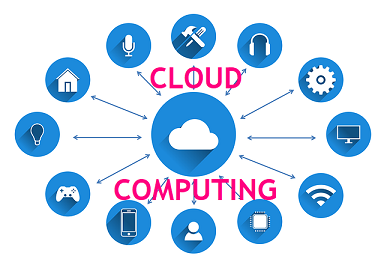Cloud computing is the delivery of computing services including servers, storage, databases, networking, software, analytics, etc over the Internet to offer faster innovation, flexible resources, and economies of scale.
What is Cloud Computing?
Basically, Cloud computing is on-demand availability of computer system resources like data storage, computing power, software, and analytics without direct active management by the user. The term Cloud Computing is generally used to describe data centers that are available to many users at the same time over the Internet. Large clouds often have functions that are distributed over multiple locations from the central servers.
Clouds may be limited to a single organization this is also known as enterprise clouds or clouds may be available to multiple organizations known as public cloud.
Cloud Computing Definition
In simple words, cloud computing involves delivering different types of computer-related services over the Internet. This may include software and analytics to secure and safe data storage and networking resources and everything that can be delivered via the Internet.
Basically, cloud computing is the delivery of computing services online over the Internet to offer faster innovation, flexible resources, and economies of scale. These services include servers, storage, databases, networking, software, analytics, etc. Cloud computing relies on sharing of resources to lower your operating costs, run your infrastructure more efficiently and scale as your business needs change. Cloud computing allows enterprises to minimize up-front IT infrastructure costs. It also allows companies to get their applications up and running faster, with improved manageability and less maintenance.
How Does Clouding Computing Work
You probably use different cloud-based applications in your routine life. You are getting benefits from cloud solutions every time when you send a file, e-mail to your colleague via the web, use a mobile app, download an image or play an online video game. All these types of services are stored in the cloud and exist in digital space which are easily available by cloud computing.
Storing your information on OneDrive, SharePoint, or an email server is much different from keeping that data on a desktop hard drive or in a USB stick. You can access this data from just any computer that has internet access.
Characteristics of Cloud Computing
There are five defining characteristics of cloud computing that makes it cloud. There are as under:
On-demand self-service:
You can use it whenever you need it and pay for it. In simple words, the cloud is a form of utility computing. Whenever you need a service just create an account or pick your provider, and your services will be available to you anytime.
Broad network access:
You must be able to access from across the web using devices that has internet connectivity. Wherever you want your cloud data will be accessible through web browsers.
Resource pooling:
Multiple person can share the same resources. These can be assigned and distributed as per their need.
Rapid elasticity:
Cloud can grow and shrink its services as much as possible and as per requirement without affecting any of its users or their information.
Measured service:
You can analyze how often people are using the cloud services. Most of the cloud service providers utilize pay-as-you-go model to ensure that their clients are getting what they are paying for. Clients pay only what they have used.
Benefits of Cloud Computing
There are numerous benefits of cloud computing. It has so many uses that it is impossible to count them. However some of them are as under:
- Cloud computing provides an easy way to hold all your necessary data that can be accessed online whenever required. You can rent cloud storage from cloud provides at a low price and scale it according to your requirement.
- Cloud provides a much faster and cost-effective disaster recovery and data protection than traditional solutions could ever offer.
- If you use cloud, you don’t need to buy external hard drives for storage of critical information. Companies can save much annually by migrating virtualized operating system instances in the cloud.
- Cloud gives you access to professional staff and provides advanced security systems and cutting-edge hardware and software which adds up to the projected savings.
- People can work together more efficiently and efficiently using cloud. People can work for a large international company with locations across the world.
- Cloud can grow and shrink the services as per the requirement without affecting any of its users or their information.
- Companies can can access high-performance hardware and software to improve their operations.

